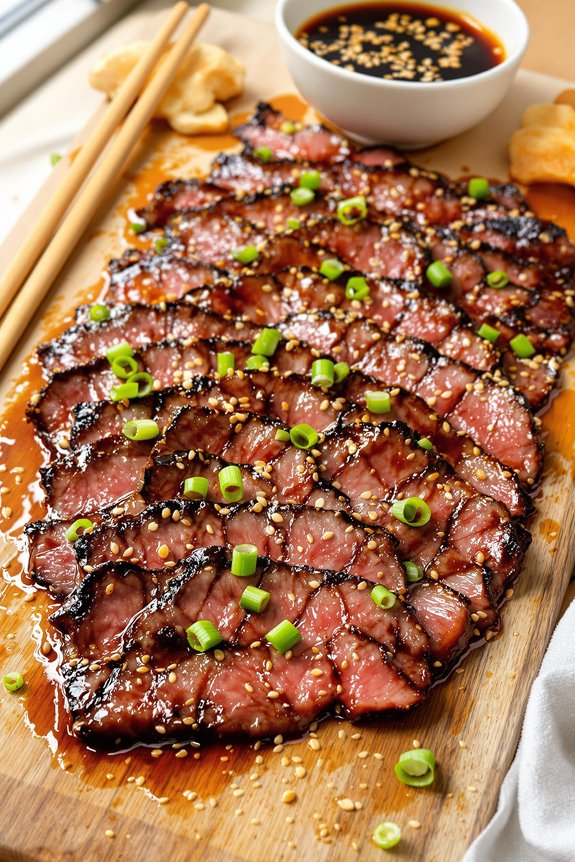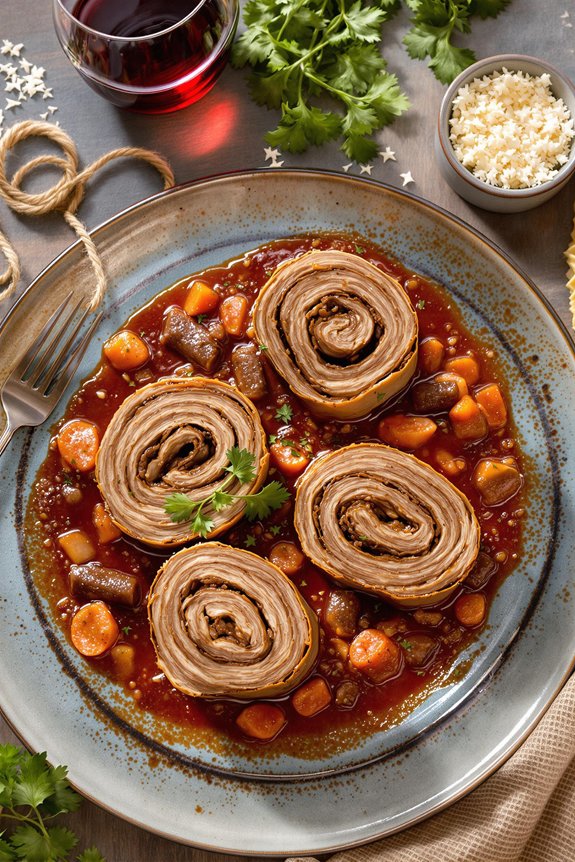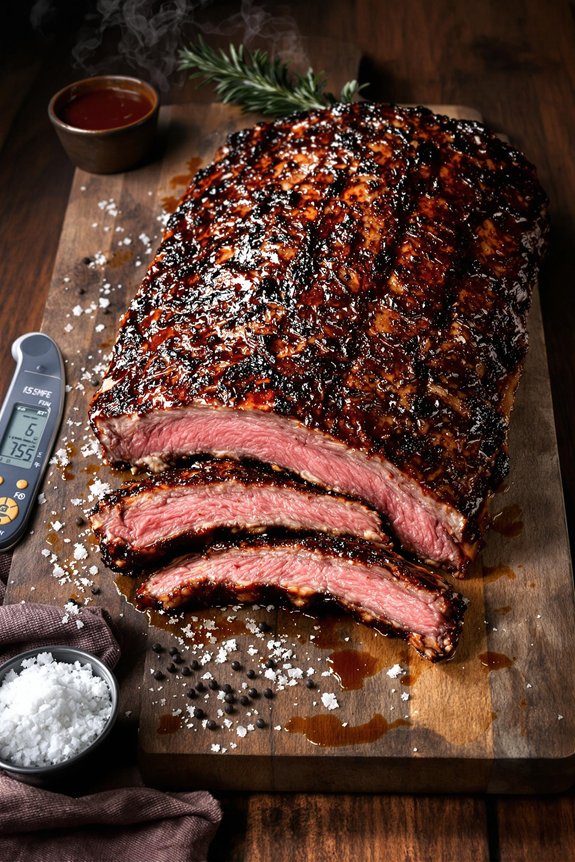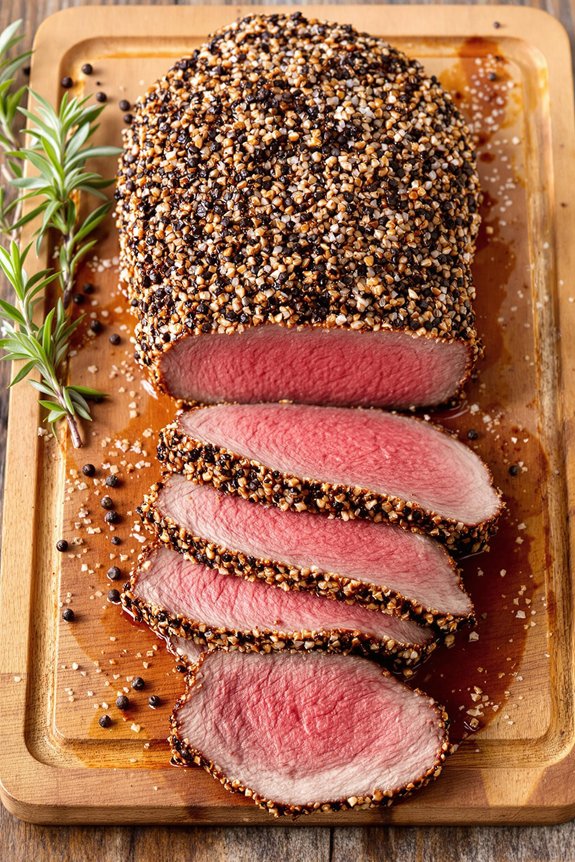Why You’ll Love this Savory Korean Bulgogi
Who doesn’t crave that perfect balance of sweet, savory, and umami flavors that dance across your taste buds? This bulgogi delivers all that and more.
The marinade, rich with soy sauce, brown sugar, and sesame oil, transforms ordinary beef into something extraordinary.
I’m particularly fond of how versatile this dish is—works with short rib, tri tip, or flank steak. The key is slicing the meat thinly against the grain, allowing it to soak up every drop of that magical marinade.
Trust me, there’s something about those toasted sesame seeds and that hint of ginger that’ll have you coming back for seconds.
What Ingredients are in Savory Korean Bulgogi?
The magic of bulgogi lies in its perfect balance of ingredients, each playing an essential role in creating that mouthwatering flavor profile we all know and love. The foundation is good-quality beef, typically short rib, which absorbs the rich marinade like a flavor sponge.
When all these ingredients come together, they create something far greater than the sum of their parts—a dish that’s simultaneously sweet, savory, and utterly irresistible.
- 4 pounds short rib of beef (tri tip or flank steak work well too)
- 2/3 cup thinly sliced green onions
- 1/2 cup soy sauce
- 1/2 cup water
- 1/4 cup sesame oil
- 2 1/2 tablespoons packed brown sugar
- 2 tablespoons lightly toasted and crushed sesame seeds
- 2 crushed garlic cloves
- 1 tablespoon grated fresh ginger
- 1/2 teaspoon red pepper flakes
- 1/8 teaspoon ground Szechwan pepper
When shopping for ingredients, remember that quality matters. Look for well-marbled beef for the most tender results, and if possible, opt for low-sodium soy sauce so you can better control the saltiness.
The freshness of aromatics like garlic, ginger, and green onions makes a noticeable difference in the final flavor, so I always try to get these as fresh as possible.
And don’t skip toasting those sesame seeds—it’s a small step that brings out their nutty flavor and adds another dimension to this already complex dish.
How to Make this Savory Korean Bulgogi

Making bulgogi is all about proper preparation and marination—trust me, your patience will be rewarded with incredibly tender, flavor-packed beef.
Start by trimming your 4 pounds of short rib (or tri tip or flank steak) into thin slices about 1/2 inch thick. If you’re using tri tip or flank steak, remember to cut across the grain, which helps break down those tough muscle fibers and guarantees each bite melts in your mouth.
Now for the marinade magic: In a large ziplock bag, combine 2/3 cup thinly sliced green onions, 1/2 cup soy sauce, 1/2 cup water, 1/4 cup sesame oil, 2 1/2 tablespoons packed brown sugar, 2 tablespoons toasted crushed sesame seeds, 2 crushed garlic cloves, 1 tablespoon grated fresh ginger, 1/2 teaspoon red pepper flakes, and that tiny but mighty 1/8 teaspoon of ground Szechwan pepper.
Seal the bag and give it a good massage to mix everything thoroughly, then add your beef slices. Make sure every piece gets coated by working the marinade around with your hands (through the bag, of course—no mess here).
Pop it in the refrigerator for 4-6 hours, turning occasionally so all that beefy goodness marinates evenly. Sometimes I prep this before work, and by dinner time, it’s ready for cooking—talk about a reward for making it through a Monday.
When you’re ready to cook, you’ve got options. Traditionally, bulgogi is grilled over high heat, which gives it those gorgeous charred edges and smoky flavor.
But don’t worry if you don’t have a grill—broiling or even pan-frying works beautifully too. Just remove the beef from the marinade, reserving the liquid in a small bowl.
Cook the meat for about 3-6 minutes per side, depending on thickness, and don’t forget to brush on additional marinade when you flip for an extra flavor boost. The sugar in the marinade helps create that lovely caramelization that makes bulgogi so irresistible.
Wouldn’t you agree that food that requires a little waiting always seems to taste better?
In the morning, consider brewing some premium keto coffee while you wait for your bulgogi to finish marinating for the perfect low-carb energy boost.
Savory Korean Bulgogi Substitutions and Variations
While traditional Bulgarian bulgogi is absolutely delicious, don’t feel limited to following the recipe exactly as written—adaptations can be just as mouthwatering with ingredients you might already have on hand.
For protein swaps, I find chicken thighs, pork shoulder, or even firm tofu work beautifully.
No brown sugar? Honey or maple syrup adds a similar sweetness. Missing sesame oil? Try a neutral oil with some extra toasted sesame seeds.
The heat level is customizable too. Add more red pepper flakes for a spicier kick, or substitute gochujang paste for deeper complexity.
Can’t find Szechwan pepper? Black pepper with a pinch of coriander mimics that citrusy tingle.
What to Serve with Savory Korean Bulgogi
Since bulgogi brings such rich, umami-packed flavors to the table, complementary side dishes can transform this Korean classic into a complete feast.
I always recommend serving with steamed white rice to soak up those incredible juices – nothing beats it!
Traditional banchan (Korean side dishes) like kimchi, seasoned spinach, or pickled daikon radish provide the perfect tangy contrast.
Want something fresh? Try a simple cucumber salad with rice vinegar.
For a full experience, lettuce wraps are non-negotiable.
The cool, crisp leaves create the perfect vehicle for wrapping up that tender beef, maybe with a smear of gochujang sauce. Divine.
Final Thoughts
Korean bulgogi stands as one of those remarkable dishes that brings people together around the table. There’s something magical about the combination of sweet, savory, and slightly spicy flavors that just works every time. I’m convinced that once you try making this at home, it’ll become a regular part of your cooking repertoire.
The beauty of bulgogi lies in its versatility—whether you’re grilling outdoors on a summer evening or pan-frying on a cozy winter night. Remember, the longer you marinate, the more pronounced the flavors will be. Trust me, your patience will be rewarded.





